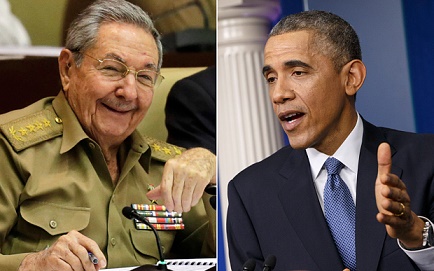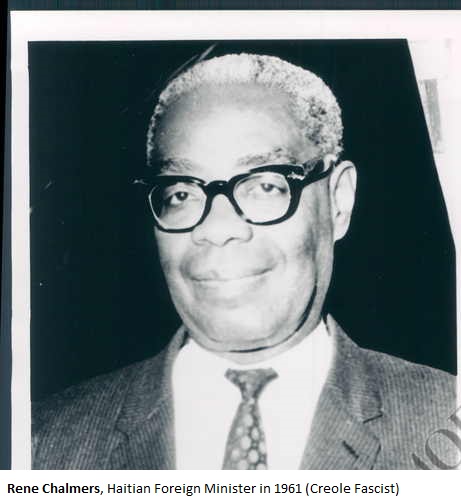CSMS Magazine Staff Writer
It was the Papa Doc regime in Haiti that sold to the United States the vote needed to secure Cuba’s expulsion from the OAS in Punta del Este, Uruguay in January of 1962. Haitian Foreign Minister René Chalmers, then Papa Doc top diplomat, ratified the conspiracy. It was done in exchange for money but also in exchange for logistical supports against a growing leftist movement in Haiti—the only real opposition threatening his regime. By 1962, François Duvalier had already amended the Haitian constitution and declared himself president-for-life. The Haitian army’s hierarchy had been decimated and replaced by cronies totally submissive to Papa Doc’s dictates. Traditional opposition leaders were either dead, forced underground or fled into exile. Standing on his way to have it all was a leftist movement made up of students’ union and Marxist political parties like PEP (Parti d’Entente Populaire) and PPLN (Parti Populaire de Liberation Nationale).
Papa Doc cried RED, and Washington hastily heeded the cry. But to seal the deal, the fascist dictator in Port-au-Prince had to prove that he could take and scrupulously follow orders. Consequently, the plot against Cuba was a golden opportunity for the TonTon Macoutes to prove they were serious.
By the fall of 1961, the sharp geostrategic divide between Washington and Havana was irreversible. Policy planners in the US capital had no intention of letting Cuba slip out of their fold. On January 21st 1962, the OAS held the Eighth Meeting of Consultation of the Ministers of Foreign Affairs in Punta del Este, Uruguay. The United States had pushed representatives from Central America to advocate a hard line against Cuba. In addition to this, they were instructed to walk out if sanctions were not imposed on Cuba.
“Argentina, Brazil, Chile, Bolivia and Ecuador were opposed to sanctions, while Uruguay and Haiti were uncertain. The United States Secretary of State Dean Rusk was hopeful that 14 votes, two thirds of the council would suffice to ensure U.S. policy in the region. After initial talks, the foreign minister of Haiti had a series of private discussions with the U.S. party. As a result, the U.S. agreed to resume aid to the nation in return for their support of sanctions against Cuba. Aid to Haiti had been suspended following the rise of the authoritarian autocrat François Duvalier.” (Wikipedia)
The Haitian people had nothing to do with it, as one could see. Since the 1860s, Cuba and Haiti have been sister countries. Haiti had always been supportive of Cuba in its fight against colonialism. Legendary poet Oswald Durand confirmed this assertion in his 1865 poem Allons-donc Frères Cubains (Let’s go Cuban Brothers). Cuba was then locked into a bitter fight for independence against Spain. Later in 1895 in Cap Haitien, José Marti and Anténor Firmin spent a weekend long, trying to find a formula for Caribbean Federalism—an old idea that Toussaint Louverture preached a century earlier.
Cuba held firm
 Cuba never blinks, and the OAS agrees. It was a historic moment at the OAS last week in Panama when US president Barack Obama humbly stood and exchanged a handshake with Raul Castro, president of Cuba. All this took place under the gleeful eyes of stylish Brazilian president Dilma Rousseff. This handshake marked Cuba’s official reintegration into the OAS after 52 years of a forced absence. Historic by all accounts, but it was the resilience of the island nation that made it happen. The Cuban leadership held firm to its principles and the rest of Latin America followed a pace behind. Noam Chomsky, well-known scholar and MIT professor who has written extensively on US quest for global dominance, greeted Cuba’s return as yet another victory for Latin America in the region’s increasingly growing clout at asserting itself away from imperial control.
Cuba never blinks, and the OAS agrees. It was a historic moment at the OAS last week in Panama when US president Barack Obama humbly stood and exchanged a handshake with Raul Castro, president of Cuba. All this took place under the gleeful eyes of stylish Brazilian president Dilma Rousseff. This handshake marked Cuba’s official reintegration into the OAS after 52 years of a forced absence. Historic by all accounts, but it was the resilience of the island nation that made it happen. The Cuban leadership held firm to its principles and the rest of Latin America followed a pace behind. Noam Chomsky, well-known scholar and MIT professor who has written extensively on US quest for global dominance, greeted Cuba’s return as yet another victory for Latin America in the region’s increasingly growing clout at asserting itself away from imperial control.
We saw it coming, because for many years, it was the United States that became isolated as more and more countries of Latin America started openly and loudly to advocate on behalf of Cuba’s reintegration of the OAS, an institution of which Cuba was a founding member back in 1948.
Haiti not only should be proud but also should learn from this fight for self-determination. One should always stand up for his rights, as long as he knows he’s right!
Note: Dr. Ardain Isma is Chief-Editor of CSMS Magazine. He is a novelist. His latest work of fiction, titled Midnight at Noon, is a critically acclaimed and powerful novel that describes horrific tales of raw exploitation in Haiti and what can be done to rescue Haiti from the brink. To order a copy, click here: Midnight at Noon. Dr. Isma is also a scholar who teaches Cross-Cultural Studies at UNF. He can be reached at publisher@csmsmagazine.org Also, like us on cebook: www.facebook.com/csmsmagazine



History has been made.